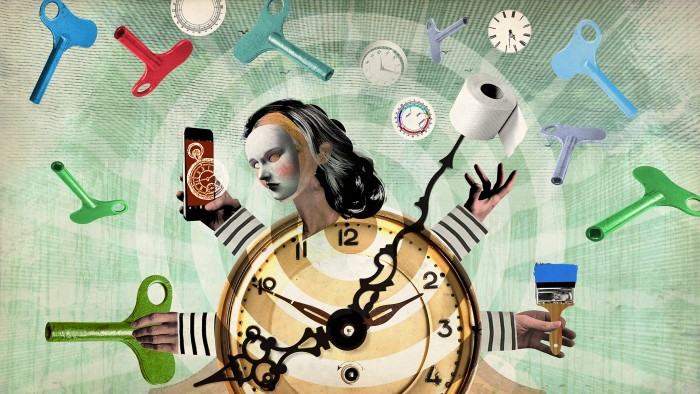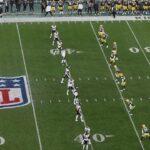Unlock the Editor’s Digest for free
Roula Khalaf, Editor of the FT, selects her favourite stories in this weekly newsletter.
An arresting claim has dropped into my inbox. A quarter of Brits, a new survey says, are sending emails from the loo, because they are so pressed for time. “Relaxing is a thing of the past”, wails the press release, which says that a third of respondents are continuing to work on their phones in the evening — “while watching their TV programmes”. Ah.
With “overwhelm” a feature of modern life, reports such as this imply that harassed workers are forced to multitask to keep on top of ballooning demands. But when 13 per cent of respondents admit to having done a weekly online shop during a business meeting, I wonder what’s happened to Saturday — and to their boss. Have we reached peak procrastination, in which meetings are now a performative adjunct to real life — walking the dog and cleaning the house, which respondents to this survey had done while on work calls?
Proponents of multitasking like to remind us that Archimedes had his eureka moment while in the bath. But he was letting his mind wander while he soaked. He wasn’t sitting there with his camera off, trying not to splash while others warbled on.
I recently asked a painter for a quote for some decorating. We got chatting while he took a look at various walls. Since the pandemic, he told me, he’s been flabbergasted by how often he arrives at a house to find grown men sitting on their sofas, watching sport in the middle of the day while vaguely tapping on their keyboards. This puts a new complexion on “overwork”.
These days, if you do just one thing at a time you’re thought to be a plodder. But 20 years of evidence tells us that task-switching makes most people stupider. A University of Utah study from 2006 found that talking on the phone while driving is as dangerous as being drunk: it slows reactions. The same team has more recently reported that car “infotainment” systems are even more dangerous than phones in terms of distraction.
Our brains are primarily wired to do one thing at a time. Even walking and talking starts to get tricky when we get old. This doesn’t mean life has to be a monotonous sequence. Many workers enjoy toggling between tasks, according to the Centre for Attention Studies, at King’s College London, and it can be positive. Indeed, “interleaving” — switching between topics then coming back to them later — is all the rage in schools as a proven technique for exam revision.
But growing levels of anxiety mean it’s important to turn the conversation to focus. Difficulty concentrating is highly correlated with some of the anxiety disorders recognised by the American Psychiatric Association. And we tend to overestimate our ability to multitask. In fact, those most prone to juggling should do it least: because studies show they are more impulsive and have less executive control.
I fear I fall into that latter group, but I’ve recently found two simple hacks. I tried checking email only twice a day, but that doesn’t suit my personality or my working life. Instead, I’ve gone back to handwriting a to-do list. The list’s existence releases my brain from anguish — as long as the tasks are detailed enough. And using pen and paper seems to imprint it more deeply into my subconscious. This is supported by new research which finds that we make more elaborate brain connections when we write than when we type. Those connections are crucial for memory formation — and this makes it imperative to keep children going with handwriting.
I’m also trying out what Cal Newport, in his book Slow Productivity, calls a “pull system”. Essentially, you focus ruthlessly on your top three projects and dodge as much as possible of the premature communication, meetings about meetings and messages about meetings which relate to later projects. Only when you’ve finished one of your top three do you pull the next one up into that slot.
We will all have different versions of this system — and I suppose it could just be called “focus”. But following my own version has made me reflect how often the distinction gets lost between work that actually generates revenue, drives things forward and has meaning; and work that is process. By which I mean the pre-meeting, the compliance training module, the ever-swelling “reply all” email chain and so on. The first kind of work is far more satisfying. The second may well be the kind that office workers report doing on the dog walk and the toilet — and what my new decorator friend says he’s glad to have less of in his physical job.
Such process tasks, I suspect, are more enjoyable if done to a background of music, texts, scrolling or intermittently checking the football score. The problem is that people who switch between multiple channels — dubbed heavy media multitaskers by researchers at Stanford — display worse memory and lower executive control, even when focusing on a single job.
It turns out there are some “supertaskers”, those who are able to handle multiple tasks without losing efficiency. On brain scans, this group exhibit less brain activity, not more, when additional tasks are added. Unfortunately, only about 2 per cent of us are in that category. So it would be kinder to ourselves, and our employers, to acknowledge that attention spans are not infinite, and treat them with care.







